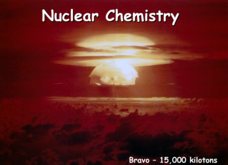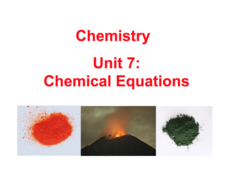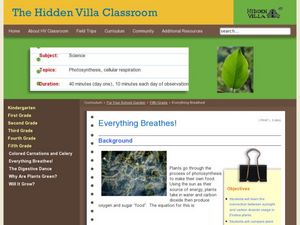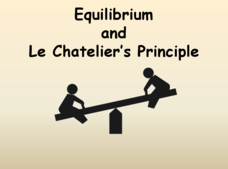Northeast Foundation for Children, Inc.
Classroom Setup: Grade 3
There's a lot of thought that goes into setting up safe and supportive classroom environments. From establishing a whole group meeting area and arranging desks, to organizing classroom supplies and creating bulletin board displays,...
Curated OER
Control of Prokaryotic (Bacterial) Genes
A nicely formatted set of slides that logically follow and define the structure and function of the genes in Bacteria. The repressor proteins and other gene regulators are listed and diagrams support the explanations of their function on...
Curated OER
Photosynthesis:The Calvin Cycle
From the light reaction to the Calvin cycle, this presentation contains information about the various stages of photosynthesis. This is a great supplement to some of the biochemistry-heavy presentations about the specific...
Science Geek
Nuclear Chemistry
Which bichemicals wash up on shore? Nucleotides! Presentation covers alpha, beta, and gamma radiation. Includes a comparison of fission versus fusion. Presentation is the second in a five-part series.
Normal Community High School
Chemical Equations
Viewers learn how to identify the substances in a chemical reaction, how to balance it, and the different types of chemical reactions by watching a presentation that also includes a review of monomers and polymers. The presentation...
Curated OER
Cellular Respiration stage 1: Glycolysis
Ten reactions involved with the process of glycolysis within cellular respiration are summarized here. The aerobic stages and anaerobic interactions leading to fermentation are detailed and wonderful diagrams to support the information...
Royal Society of Chemistry
The 400m Event—Chemistry and Sport
How do Olympic runners succeed in physically demanding events like the 400-meter dash? Physiology scholars explore the relationship between acids, bases, and the muscular system through a scenario-driven activity. The activity focuses on...
Curated OER
Uses of Coal
An interesting series of puzzles and word games are available in this multi-page collection, which focuses on coal. Learners practice math and language arts skills as they solve the puzzles, and learn many facts about coal at the same time.
Curated OER
Light Stick Chemistry
In groups of three with the lights off and the shades drawn, investigators place inactivated light sticks, in three beakers: one filled with ice water, another with lukewarm water, and the other with room temperature water. They wait...
Curated OER
Everything Breathes!
Fifth graders test plants in the dark and in the light to see which grows better and produces more carbon dioxide. In this plants lesson plan, 5th graders also create ways for plants to go through photosynthesis that they can observe.
Curated OER
Green Chemistry
The principles of pollution control on a molecular level are summarised here. The reasoning and study behind the principles are described, and your class will undestand how some techniques are developed to be more efficient.
Curated OER
Respiration
This series opens with diagrams of experimental setups. A data table is displayed and questions are asked, indicating that the intent is for lab groups to perform the depicted experiments. At slide twelve, a coherent lesson about the...
Science Geek
Equilibrium and Le Chatelier's Principle
Time to shake up the status quo with a presentation that describes Le Chatlier's Principle and has pupils examine situations in which equilibrium is upset. Four examples show different stresses to the reaction and the resulting shift.
Curated OER
Rates of Chemical Reactions-The Iodine Clock Reaction
Learners investigate the reaction rate of iodine and soluble starch. In this rates of chemical reactions lesson plan, students study the effects of varying concentrations of reactants and varying temperatures of reactants on the reaction...
University of Minnesota
Homeostasis of Thermoregulation
Whether you're battling the flu or trying to warm up on a chilly day, your body's ability to react to temperature change is fascinating! Anatomy scholars discover the fantastic feedback loops that control body temperature in a rigorous...
Curated OER
Photosynthesis
Learners conduct experiments with plants. In this photosynthesis activity, students examine plants under different types of lights. They calculate the amount of dissolved ocygen concentration and compare it to the formula for...
Curated OER
Foreign Economics
Why do so many countries export cars? Economists examine this and other foreign economics principles through this introductory activity. A brief text explains international trade, then lists the top 11 leaders in global trade, along with...
Curated OER
Aerobic/Anaerobic Respiration
Both aerobic and anerobic respiration are introduced in this succinct PowerPoint. The chemical equations for both are included. The last slides give instructions for a lab activity in which pupils use a gas sensor to measure the...
Virginia Department of Education
Finding the Formula and Percent Composition
Do you have mole problems? If so, call Avogadro at 602-2140. The lesson starts with pupils working independently to solve for molar mass of ionic compounds. Then they learn to solve for percent composition and later perform an...
Virginia Department of Education
Radioactive Decay and Half-Life
Explain the importance of radioactive half-life as your high school biologists demonstrate the concept by performing a series of steps designed to simulate radioactive decay. Pupils use pennies to perform an experiment and gather data....
K12 Reader
What’s in Your Cells?
Organelles, cellular respiration, ATP, and DNA. The passage attached to this life science reading comprehension worksheet is all about cells. After reading about diffusion and osmosis, kids answer a series of questions based on the text.
PBS
The Elements
An attractive handout displays the periodic table of elements in full color. Each group has its own color, and each element is represented by its name, chemical symbol, atomic number, and atomic weight. What makes this periodic table...
National Institute of Open Schooling
Radioactive Pollution
Radioactive pollutants can enter the body through ingestion, inhalation, absorption, or injection. The last lesson in a series of 36 introduces pupils to radioactive pollution. They study its sources, both natural and man-made, its...
LABScI
Conservation of Momentum: Marble Collisions
What happens to the momentum of an object when it strikes another object? Scholars roll a marble down a ramp so it collides with another marble. By measuring the speed of each marble before and after the collision, pupils answer this...























